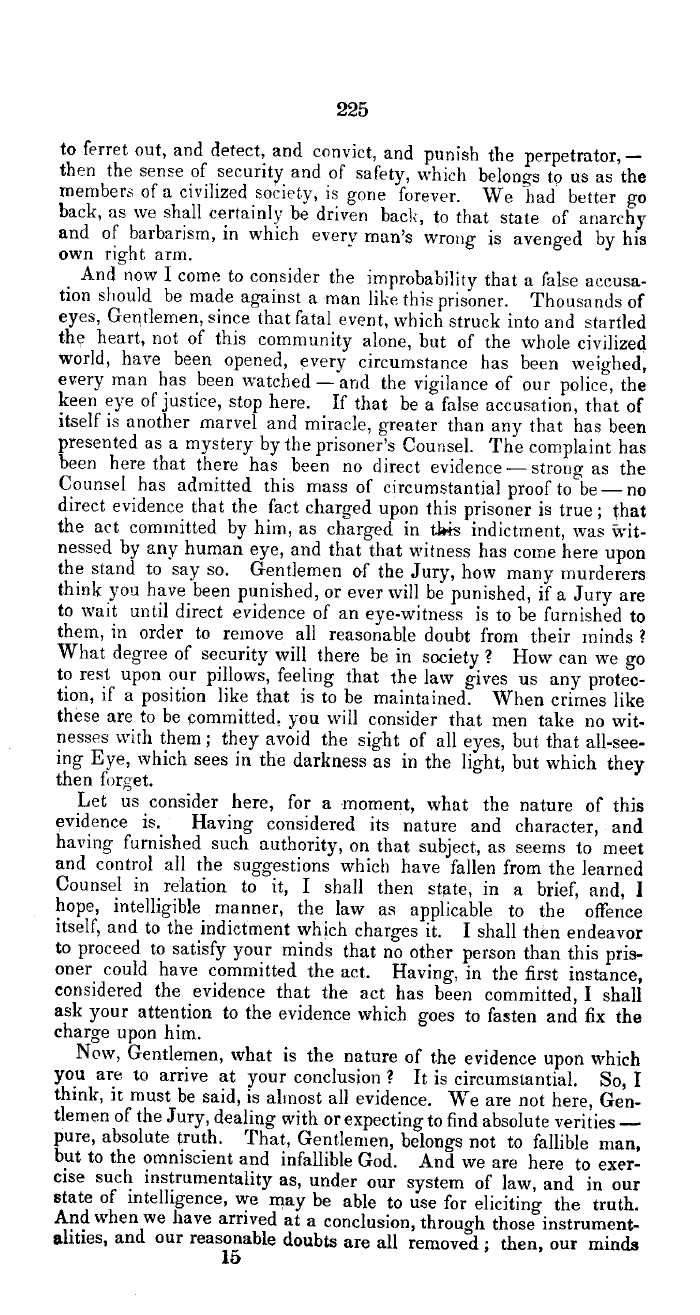|
225
to ferret out, and detect, and convict and punish the perpetrator,-
then the sense of security and of safety, which belongs to us as the
members of a civilized society, is gone forever. We bad better go
back, as we shall certainly be driven back, to that state of anarchy
and of barbarism, in which every man's wrong is avenged by his
own right arm.
And now I come to consider the improbability that a false accusa-
tion should be made against a man like this prisoner. Thousands of
eyes, Gentlemen, since that fatal event, which struck into and startled
the heart, not of this community alone, but of the whole civilized
world, have been opened, every circumstance has been weighed,
every man has been watched - and the vigilance of our police, the
keen eye of justice, stop here. If that be a false accusation that of
itself is another marvel and miracle, greater than any that has been
presented as a mystery by the prisoner's Counsel. The complaint has
been here that there has been no direct evidence - strong as the
Counsel has admitted this mass of circumstantial proof to be-no
direct evidence that the fact charged upon this prisoner is true ; that
the act committed by him, as charged in tWs indictment, was Wit-
nessed by any human eye, and that that witness has come here upon
the stand to say so. Gentlemen of the Jury, how many murderers
think you have been punished, or ever will be punished, if a Jury are
to wait until direct evidence of an eye-witness is to be furnished to
them, in order to remove all reasonable doubt from their minds ?
What degree of security will there be in society ? How can we go
to rest upon our pillows, feeling that the law gives us any protec-
tion, if a position like that is to be maintained. When crimes like
these are to be committed. you will consider that men take no wit-
nesses with them ; they avoid the sight of all eyes, but that all-see-
ing Eye, which sees in the darkness as in the light, but which they
then forget.
Let us consider here, for a moment, what the nature of this
evidence is. Having considered its nature and character, and
having furnished such authority, on that subject, as seems to meet
and control all the suggestions which have fallen from the learned
Counsel in relation to it, I shall then state, in a brief, and, I
hope, intelligible manner, the law as applicable to the offence
itself, and to the indictment which charges it. I shall then endeavor
to proceed to satisfy your minds that no other person than this pris-
oner could have committed the act. Having, in the first instance,
considered the evidence that the act has been committed, I shall
ask your attention to the evidence which goes to fasten and fix the
charge upon him.
Now, Gentlemen, what is the nature of the evidence upon which
you are to arrive at your conclusion ? It is circumstantial. So, I
think, it must be said, is almost all evidence. W e are not here, Gen-
tlemen of the Jury, dealing with or expecting to find absolute verities-
pure, absolute truth. That, Gentlemen, belongs not to fallible man,
but to the omniscient and infallible God. And we are here to exer-
cise such instrumentality as, under our system of law, and in our
state of intelligence, we may be able to use for eliciting the truth.
And when we have arrived at a conclusion, through those instrument-
alities, and our reasonable doubts are all removed ; then, our minds
15
|

